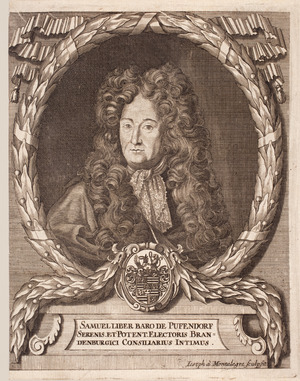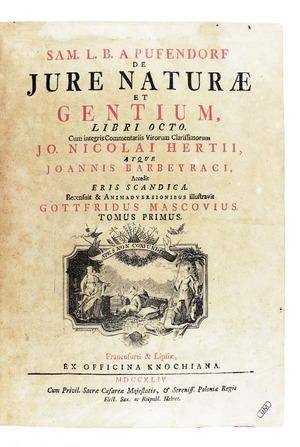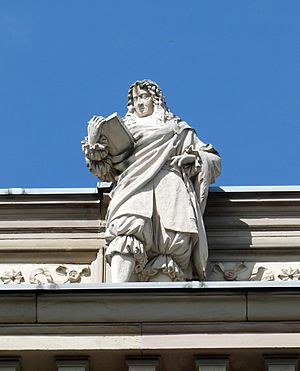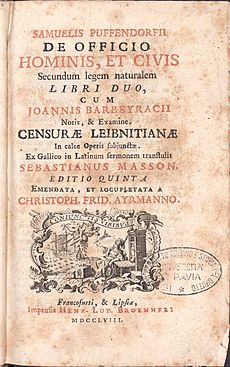Samuel von Pufendorf facts for kids
Quick facts for kids
Samuel von Pufendorf
|
|
|---|---|

Engraving by Joseph de Montalegre of Samuel von Pufendorf, 1706
|
|
| Born |
Samuel Pufendorf
8 January 1632 Dorfchemnitz, Electorate of Saxony, Holy Roman Empire
|
| Died | 26 October 1694 (aged 62) Berlin, Margraviate of Brandenburg, Holy Roman Empire
|
| Nationality | German |
| Education | University of Leipzig University of Jena |
| Era | 17th-century philosophy |
| Region | Western philosophy |
| School | Natural law |
| Institutions | University of Heidelberg University of Lund |
|
Main interests
|
Jurisprudence, political philosophy, economics and history |
|
Influences
|
|
|
Influenced
|
|
| Signature | |
Samuel von Pufendorf (born January 8, 1632 – died October 26, 1694) was an important German thinker. He was a jurist (someone who studies law), a political philosopher (someone who thinks about how governments should work), an economist, and a historian. He was born Samuel Pufendorf and later became a baron in 1694, just before he died.
Pufendorf is known for his ideas about natural law. This is the idea that there are basic rules for how people should behave, based on human nature, not just laws made by governments. He built on the ideas of other famous thinkers like Thomas Hobbes and Hugo Grotius. His thoughts on politics were important for the American Revolution. He is also seen as a key figure who helped start the Age of Enlightenment in Germany. Pufendorf often had disagreements with church leaders. He had to defend his ideas, even though his beliefs were mostly traditional Christian ones.
Contents
Discovering Samuel Pufendorf's Life
Early Years and Education
Samuel Pufendorf was born in Dorfchemnitz, a small town in what was then the Electorate of Saxony. His father was a Lutheran pastor, and Samuel was expected to become a minister too.
He went to a special school called Fürstenschule in Grimma. Then he studied theology (the study of religion) at the University of Leipzig. But Pufendorf found the teaching there too strict. He soon decided to study public law instead.
Pufendorf then moved to the University of Jena. There, he became good friends with Erhard Weigel, a mathematician. Weigel helped Pufendorf think for himself. Pufendorf started reading the works of important thinkers like Hugo Grotius, Thomas Hobbes, and René Descartes.
In 1658, Pufendorf left Jena and became a tutor. He worked for the family of Peter Julius Coyet, a Swedish diplomat in Copenhagen.
Time in Prison and New Ideas
While Pufendorf was in Copenhagen, the King of Sweden, Charles X Gustav, was trying to force an alliance on Denmark. This led to fighting, and the Danes arrested the Swedish diplomats and their staff. Pufendorf was also arrested and spent eight months in prison.
During his time in prison, Pufendorf thought deeply about the books he had read, especially those by Grotius and Hobbes. He started to develop his own system of universal law in his mind. After he was released, he went with his students to the University of Leiden.
Pufendorf's Career as a Writer
Publishing His First Book
In 1660, Pufendorf was able to publish his ideas in a book. It was called Elementa jurisprudentiae universalis libri duo, which means "Elements of Universal Law: Two Books." He dedicated the book to Charles Louis, the Elector Palatine.
The Elector was so impressed that he created a new job for Pufendorf at the University of Heidelberg. This was a special professorship for the law of nature and nations. It was the first job of its kind in the world. In 1665, Pufendorf married Katharina Elisabeth von Palthen.
Challenging the German Empire
In 1667, Pufendorf wrote a book called De statu imperii germanici liber unus. This means "On the Present State of the German Empire: One Book." He published it secretly using a fake name. The book caused a big stir.
In it, Pufendorf openly criticized how the Holy Roman Empire was organized. He strongly pointed out problems with the powerful House of Austria. He also attacked the actions of church leaders who held political power. Pufendorf believed that Germany should solve its own problems without help from other countries.
Because he criticized a new tax, Pufendorf had to leave Heidelberg in 1668. It was hard to find new opportunities in Germany after the Thirty Years' War. So, Pufendorf moved to Sweden.
Moving to Sweden and Major Works
In 1668, Pufendorf was invited to work at the University of Lund in Sweden. His time there was very productive.
In 1672, he published his most famous work, De jure naturae et gentium libri octo. This means "On The Law of Nature and Nations: Eight Books." The next year, he wrote a shorter version called De officio hominis et civis iuxta legem naturalem, or "On the Duty of Man and Citizen, according to Natural Law." This book included his ideas on what makes a war fair or "just."
In De jure naturae et gentium, Pufendorf expanded on the ideas of Grotius and Hobbes. He added his own thoughts on international law. He argued that natural law only applies to this life and guides our actions. He disagreed with Hobbes, who thought that the natural state of humans was one of war. Pufendorf believed that the natural state was one of peace, but it was a weak peace that needed help to last.
Pufendorf also believed that the state (or country) is like a moral person. But he said that the state's will is just the sum of all the individual people's wills. He was one of the first to have ideas similar to Jean-Jacques Rousseau's later concept of the "social contract." Pufendorf strongly argued that international law should connect all nations, not just Christian ones. He believed all nations are part of humanity.
Royal Historian and Church-State Relations
In 1677, Pufendorf became the Royal Historian in Stockholm, Sweden. During this time, he wrote several history books. He wrote in a very factual style and tried to use real historical documents. However, his history books often favored Sweden. For example, he claimed that parts of eastern Denmark had always belonged to Sweden.
In his book De habitu religionis christianae ad vitam civilem, Pufendorf explored the relationship between church power and state power. He introduced the "collegial" theory of church government. This theory said that the state has power over church matters (like laws affecting churches). But the church itself has its own power over religious matters. This idea helped lead to the principle of toleration, meaning that different religions could exist peacefully within a state. This theory was used in Prussia and later in other parts of Germany.
Later Life and Death
In 1688, Pufendorf was invited to work for Frederick William, the Elector of Brandenburg. But the Elector died soon after Pufendorf arrived. His son, Frederick III, kept the promises his father made. Pufendorf became a historian and a privy councilor. He was asked to write a history of Elector Frederick William.
The King of Sweden continued to support Pufendorf. In 1694, he made Pufendorf a baron. That same year, Pufendorf had a stroke and died on October 26, 1694, in Berlin. He was buried in St Nicholas Church.
Pufendorf's Key Ideas
Understanding Natural Law and Nations
In his 1672 book, De iure naturae et gentium, Pufendorf explored the ideas of natural law. He took many thoughts from Grotius and Hobbes and added his own. He believed that natural law helps guide our actions in this life.
Pufendorf disagreed with Hobbes's idea that humans naturally live in a state of war. Pufendorf thought that the natural state was one of peace. However, this peace was fragile and needed rules to keep people safe. He argued that the state is like a "moral person," but its power comes from the combined will of all the people in it. He also strongly believed that international law should connect all people, not just those from Christian nations.
Duties of People and Citizens
In De Officio Hominis et Civis Juxta Legem Naturalem ("On the Duty of Man and Citizen"), Pufendorf talked about different kinds of duties. He divided them into duties towards God, duties towards oneself, and duties towards others.
Duties towards oneself included "duties of the soul," like developing your skills and talents. They also included "duties of the body," which meant not harming yourself.
Pufendorf's Lasting Impact
Many famous thinkers, like John Locke, Jean-Jacques Rousseau, and Denis Diderot, thought Pufendorf's books should be studied in law schools. He greatly influenced important legal minds like William Blackstone and Charles de Montesquieu.
Pufendorf had some disagreements with another famous thinker, Gottfried Leibniz. They had similar religious views but different ideas about philosophy. Leibniz once said Pufendorf was "barely a jurist, let alone a philosopher." Despite this, Pufendorf's ideas remained very important.
See also
 In Spanish: Samuel Pufendorf para niños
In Spanish: Samuel Pufendorf para niños




